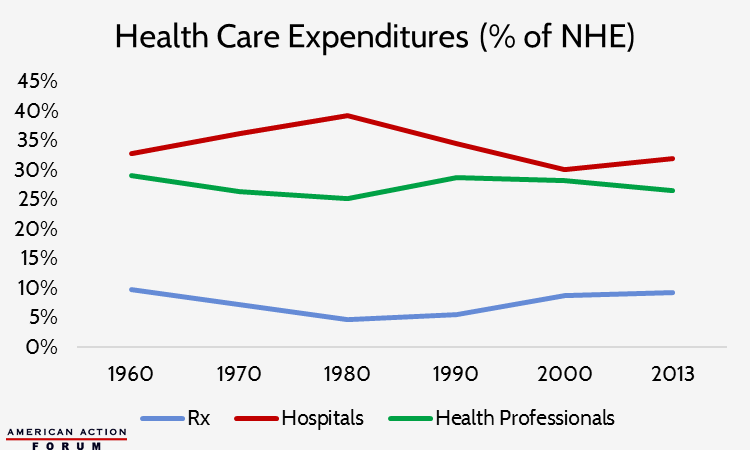Weekly Checkup
April 27, 2018
Addressing One Cause of High Drug Prices
On Tuesday, Bloomberg reported that federal prosecutors specializing in antitrust cases are close to indicting two generic drug makers and several company executives on charges of price fixing. Additionally, a third company may be nearing a plea deal. The investigation into anti-competitive behavior in the generic drug market apparently spans at least the last four years.
I can’t comment on the relative merits of this action, nor do I have any insight into the relative guilt or innocence of the various people and companies caught up in this investigation. But there is a bigger point to be made here: Amid the numerous and prominent complaints about drug prices, it’s important to remember that the drug market isn’t monolithic, and a number of factors drive drug pricing. As American Action President Doug Holtz-Eakin has pointed out repeatedly, there are a number of things going on when we talk about drug prices.
Drug costs as a percentage of national health expenditures have remained largely steady for decades, at about 10 percent. When we talk about rising drug costs, therefore, we’re not talking about a steady, decades-long increase but rather a few particular dynamics. First, when a new, novel treatment comes to market, it is always priced high at first, but these prices come down as competition picks up, and over time this initial high price doesn’t dramatically affect average drug spending. A second issue has to do with the growth in biologic treatments and specialty drugs, uniquely high-cost medications usually due to the way they’re manufactured. Because of the nature of the treatment, competition doesn’t put as much downward pressure on their prices as it does on other drugs.Third, and relevant to the recent news, are the effects of bad actors in the pharmaceutical space who try to game the system or in some cases break the law to make profits in anti-competitive ways.
Martin Shkreli of Turing Pharmaceuticals became the poster child for bad pharmaceutical actors when he took advantage of a lack of competition for a $13 generic drug and ratcheted up the price by over $700. But Shkreli didn’t engage in the kind of collusion and price fixing alleged in the Bloomberg story. Pure and simple, price fixing is bad in a market-based economy. It’s bad when the government tries to do it, and it’s bad when private companies try to do it. There isn’t a silver bullet when it comes to addressing high drug prices, but enforcing existing laws concerning monopoly power and anti-competitive behavior is an excellent way to address one driver of high prices.
Chart Review
The chart below demonstrates that the availability of advanced pharmacological treatments has likely contributed to the slowdown in other expenditures. Although pharmaceutical expenditures have stayed at or below 10 percent of overall health expenditures, the decrease in spending on hospital stays and other health professionals is correlated with the increase in pharmaceutical spending.
– from Understanding Pharmaceutical Drug Costs
Worth a Look
Health Affairs: Pervasive Income-Based Disparities In Inpatient Bed-Day Rates Across Conditions And Subspecialties
Axios: Medicare may require hospitals to share electronic records
New York Times: Infant Deaths Fall Sharply in Africa With Routine Antibiotics











